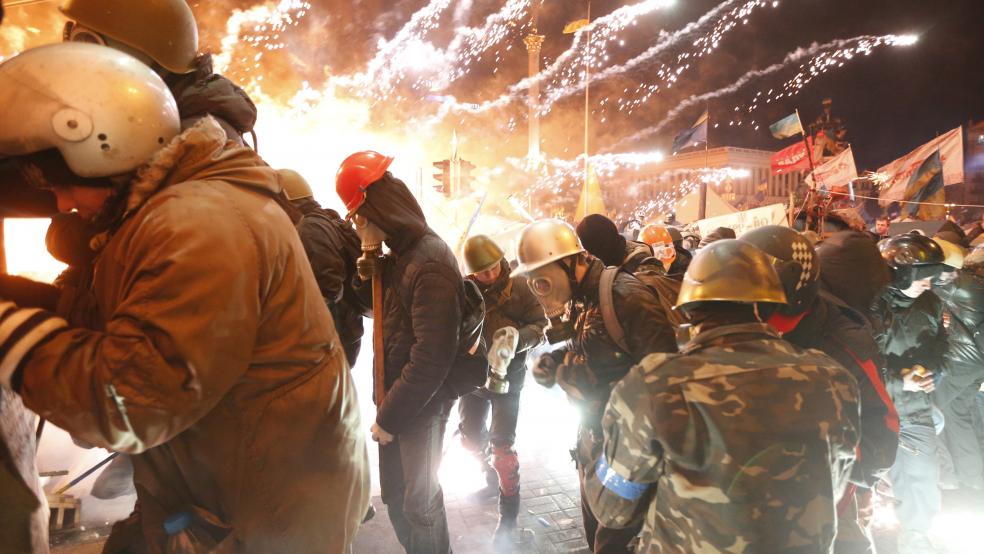Ultimately, the deal didn’t matter. Ukraine’s political crisis ended when President Viktor Yanukovych fled Kiev on Saturday, leaving his offices and presumed home to be occupied by the protestors camped in his square. The painstakingly negotiated political settlement – elections in December, a national unity government, and constitutional changes - gave way to street power. Lenin was right: the power was just lying there, waiting to be picked up.
For the US, it was a rare win that almost didn’t happen. The Europeans had busily midwifed an agreement between Yanukovych and his enemies to an unsatisfying conclusion, and for a day, it looked like they might have compromised away the opposition’s advantage. It didn’t matter. The deal didn’t placate the Ukrainians in the streets, who finally scared Yanukovych enough that he fled.
Related: Ukraine Drama—President Is Ousted, Former P.M. Is Freed
Ukraine’s (currently second) revolution is good for the United States, without question. The only fly in the ointment is that democratically, it’s not quite kosher. Yanukovych and his eastern Ukrainians have a point. It’s the same point that made the Obama Administration queasy about the coup in Egypt--if Ukrainians and Egyptians are to live in a democratic nation, their choices must have consequences. Yanukovych and Egypt’s 5th President, Mohamed Morsi, both won their elections, and they were both deposed by force.
The similarities probably end there. Ukraine sits on the periphery of Europe but under Russia’s shadow, in a part of the world where power rests in a fuzzy middle between political salons and the streets. It’s not completely in the streets, like in Syria or (less so) Egypt, but it’s not wholly in parliament either, like in Germany. Ukrainian police snipers, for example, murdered several protesters. It’s tough to imagine French cops doing that--it’s a bit easier to imagine Iraqis. In between, there’s sort of a gray area.
One of the achievements of the American hegemony has been the spread, throughout that gray area, of its norms of mutual restraint. In the West, nonviolent protests have traditionally posed a problem to governments. As long as the protestors were peaceful – as long as they just sat there, or sat in trees, or sat in the dean’s office – police couldn’t really do much to them. They could be fingerprinted, occasionally handcuffed, and symbolically jailed. But if there were enough of them, it was futile. Police can’t shoot protestors unless they’re shooting back. Rocks don’t count.
Related: Russian Ties to Ukraine Go Much Deeper than Gas
That norm spread worldwide in the 1970’s to the early 1990’s, when dozens of countries in Latin America, south and central Europe, and the Pacific Rim began the increasingly peaceful transition from authoritarian to democratic rule. The political scientist Samuel Huntington, later famous for his “Clash of Civilizations” thesis, called this the “third wave” of democratization. By the 1990s, such transitions had become mostly de rigueur, with the peaceful turnover of power to new democrats in places like Chile, Portugal, and Poland.
But hegemony is fleeting, and likewise, that norm has been breaking down for several years now. The lesson of Syria (and Egypt, in a different way) is that nonviolent norms are bunk. If you want to stay in power and are willing to do whatever it takes, you can. You can be Assad. If you want a revolution – a real revolution, where the state changes fundamentally – you have to take it. The Ukrainian opposition did take it, with raw power. Now they have to defend it with the same.
Their revolution thus hangs on a knife-edge. The rump government and its supporters, meeting in the pro-Russian eastern Ukraine, issued a resolution that it will ensure order and lawfulness on its territories. One of its members explicitly called for the creation of civilian militias. Of course – they know where power lies.
SLIDESHOW: 35 Intense Photos of the Ukraine Protests
The question is will Russia accept the overthrow of its ally? It did once – the same Yanukovych, actually – in 2004-2005, when the Bush democracy crusade was at its peak. But that was a revolution against an election marred by fraud and puppeteered by a corrupt regime. The modern Yanukovych was elected, and then deposed. It must shock Putin’s admittedly loose sense of justice that his only elected friend has been deposed by a grassroots coup. The hypocrites.
Perhaps it shocks his sense of safety as well. If it could happen in Ukraine, why not in the land of the Czars? It’s also a clear casus belli, even by the West’s norms, or at least cause for subterfuge. Russian subterfuge is often blunt, but usually effective. Just ask the Georgians, whose territory has been chewed away by Russian-backed separatists.
So two cheers for the win today. But power taken by force has to be defended by force. Yanukovych is still out there, and so are his people, and so is Putin. Waiting, and deciding, which shoe to drop.
Top Reads from the Fiscal Times:






